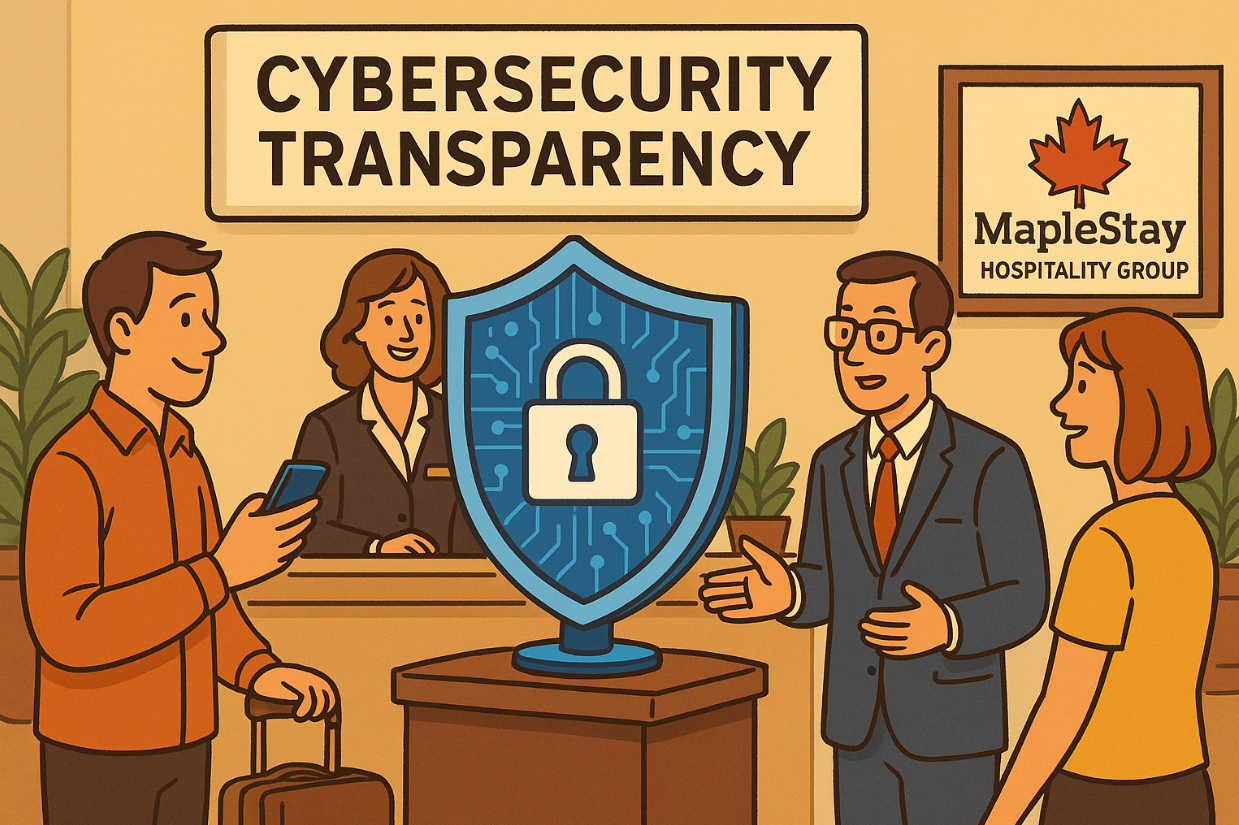Hospitality Industry Strengthens Guest Trust Through Integrated Ancillary Cyber Assurance and Value-Adding Services
The Challenge
MapleStay Hospitality Group, a Canadian hotel and resort operator with locations across major provinces, faced growing client and guest expectations for digital trust and cybersecurity transparency. As guest services became increasingly digital, from online bookings to smart room systems, the organization’s leadership recognized that its existing security investments were invisible to the public and business partners.
While MapleStay maintained strong internal IT controls and compliance documentation, it lacked a cohesive ancillary strategy to communicate its cyber resilience posture to guests, corporate clients, and regulators. Recent reports of ransomware attacks within the hospitality sector amplified customer concerns, prompting business clients and tour operators to request formal assurances of data protection under the Personal Information Protection and Electronic Documents Act (PIPEDA).
Internally, inconsistent messaging between marketing, compliance, and operations teams resulted in unclear responses to client inquiries about cybersecurity and privacy practices. Without integrated awareness programs or external assurance mechanisms, MapleStay risked losing its competitive advantage in a market increasingly shaped by digital trust and data transparency.
Our Solution
Our Ancillary and Value-Adding Services team was retained to design and implement a Cyber Assurance and Communication Enablement Program tailored to hospitality operations and guest engagement environments. The initiative focused on bridging the gap between technical readiness and public confidence by converting compliance and security investments into visible client-facing value.
Key measures included:
– Cyber Assurance Communication Strategy: Standardized how cybersecurity, privacy, and compliance achievements were conveyed to corporate clients, guests, and regulators through transparent channels.
– Client and Guest Trust Portal: Launched a digital portal providing verifiable access to MapleStay’s cybersecurity certifications, incident management protocols, and data protection measures.
– Hospitality Cyber Awareness Training: Delivered tailored awareness sessions for hotel managers, front-desk staff, and marketing teams, aligning daily guest interactions with secure data-handling practices.
– Trusted Hospitality Partner Certification: Developed a third-party verified certification mark demonstrating compliance with PIPEDA, ISO/IEC 27001, and NIST Cybersecurity Framework standards.
– Integrated Communication Materials: Embedded cyber assurance messaging across marketing collateral, digital booking platforms, and client engagement materials to reinforce trust and transparency.
By positioning cybersecurity as a visible part of the brand experience, MapleStay turned its internal controls into a strategic differentiator that enhanced confidence among guests, partners, and regulators.
The Value
Within six months, MapleStay achieved measurable improvements in trust, communication, and compliance posture:
– 30% increase in corporate booking renewals after demonstrating verifiable cybersecurity assurance.
– Recognition as an industry leader in digital trust at the Canadian Hospitality and Tourism Cyber Resilience Forum.
– 90% employee participation in hospitality-specific cyber awareness training, improving response consistency to guest data inquiries.
– Full PIPEDA and ISO/IEC 27001 compliance validation confirmed through independent audit.
– Enhanced brand reputation and lower cyber insurance premiums due to transparent assurance reporting.
By transforming cybersecurity communication into a client-facing strength, MapleStay not only reinforced its operational resilience but also elevated its brand credibility across the hospitality market.
Implementation Roadmap
1. Assessment (Weeks 1–3): Evaluate existing communication, training, and guest assurance mechanisms; identify visibility gaps and messaging inconsistencies.
2. Design (Weeks 4–6): Develop Cyber Assurance Communication Strategy and define awareness goals aligned with hospitality operations.
3. Deployment (Weeks 7–12): Launch Guest Trust Portal, deliver role-based training, and embed assurance content into digital and physical touchpoints.
4. Enablement (Weeks 13–16): Introduce the Trusted Hospitality Partner Certification program; collect guest and client feedback for optimization.
5. Continuous Improvement (Ongoing): Update awareness materials quarterly, maintain transparency metrics, and conduct annual assurance audits.


